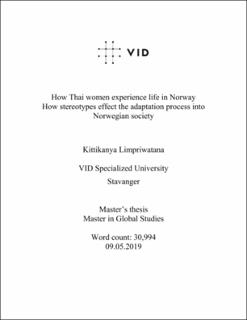| dc.description.abstract | This study aims to explore how Thai women experience life in Norway and how stereotypes affect them in their daily life. The area of fieldwork mostly took place in Stavanger, Norway during the autumn of 2018. The methods employed is qualitative research based on interviews and narratives of life stories. The participants in the study were 5 Thai women who moved to Norway 4 to 25 years ago, age from 25 to 55 years old.
Despite the globalization nowadays connected to my study, I am very interested in studying the effect of how it has an impact on people who are caught in the middle of the phenomena. In this case Thai women who migrate to Norway. Firstly, I began the study investigating if some of the cultural differences between the two cultures (Norwegian and Thai) are the reasons of some cultural misunderstanding that could lead to stereotypes or prejudice toward Thais. Furthermore, how the stereotype has an effect on the adaptation process into Norwegian society by focusing on the perspective of cultural dimensions, stereotype, intercultural communication, cross-cultural misunderstanding, and the adaptation process in to the new culture.
The study reveals that it is very challenging for many Thai women to start their life again in Norway where aspects of life work differently. They have to find out how the unfamiliar rules and unwritten rules work in their daily life with limited ability. Language is one of the most challenging problems in order to adapt into Norwegian society.
In term of family, Thai women experience life in Norway based on their natal family’s expectations and obligations that influenced by the collectivist thinking on their goals in life.
In terms of friendship, Thai female friends are the source of sharing a certain lifestyle and enjoying social activities. The unusual relationship is questioning the sincerity of the quality of the relationship. Gossip and jealousy occur among friends as these women come from various socio-economic statuses. All my informants rarely have Norwegians friends apart from the Norwegians that are related to their partners.
In terms of lifestyle, my informants mentioned that their lifestyle has changed after moving to Norway. Their life has become quite lonely and not like what they expected it would be before they moved to Norway. The language, the weather, the food, and getting to know Norwegians are very challenging situations during the adaptation process. Most of informants have become less socialized, lonelier, and some even suffered from depression.
The most challenging problem in term of the adapting process into Norwegian society are mostly based on misunderstanding and miscommunication between Thai women and Norwegians. It is clearly affecting the willingness to adapt themselves into Norwegian society.
There are many stereotypes being mentioned throughout the interviews. They were the stereotypes between Norwegians toward Thai women, Thai women towards other immigrants they met in language classes, Thai women toward Norwegians, and Thai women toward Thai women in Norway.
I have found that the stereotype that Norwegians have toward Thais is too complex to conclude in this study. It is too soon to confirm that Norwegians have such a stereotype toward Thais because some research needs to be done on the Norwegian’s side of the story.
For the stereotype Thai women have toward other immigrants they meet in language class shows has shown the process of stereotype from the start until it has changed because a person has gained a new understanding
For the stereotype that Thai women have toward Norwegian is created because of the of the effect of being unable to properly communicate in both English and Norwegian of the Thais. It has created a misunderstanding for Thai women toward the Norwegians. Together with the language problem, a limited worldview led Thais to the feeling of being stereotyped when it could be just a misunderstanding of cultures and communication problems. This wrong assumption of being stereotyped is clearly affecting the adapting process to Norwegian society.
Lastly, the stereotype I have found during the interview was that Thai women have some stereotype toward other Thai women in Norway. This stereotype is created based on the socio-economic status of the women, sharing similar sub-culture, and class differences. I have found that the stereotype Thai women have toward Thai women in Norway, effected the friendship they had with each other. | en_US |
